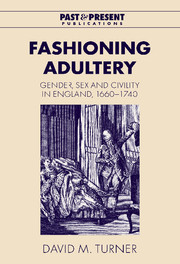Book contents
- Frontmatter
- Contents
- Acknowledgements
- Note on the text
- List of abbreviations
- Introduction
- 1 Language, sex and civility
- 2 Marital advice and moral prescription
- 3 Cultures of cuckoldry
- 4 Sex, death and betrayal: adultery and murder
- 5 Sex, proof and suspicion: adultery in the church courts
- 6 Criminal conversation
- Conclusion
- Bibliography
- Index
- Past and Present Publications
5 - Sex, proof and suspicion: adultery in the church courts
Published online by Cambridge University Press: 01 July 2009
- Frontmatter
- Contents
- Acknowledgements
- Note on the text
- List of abbreviations
- Introduction
- 1 Language, sex and civility
- 2 Marital advice and moral prescription
- 3 Cultures of cuckoldry
- 4 Sex, death and betrayal: adultery and murder
- 5 Sex, proof and suspicion: adultery in the church courts
- 6 Criminal conversation
- Conclusion
- Bibliography
- Index
- Past and Present Publications
Summary
The law played an important role in both shaping and mediating understandings of sex, marriage and gender relations in early modern England. Studying patterns of matrimonial litigation sheds light on thepractical options available to men and women in the face of their partner's adultery, while attention to their pleading strategies tells us more about expectations of marriage and the ways in which they were shaped by gender. The product of real marriages in crisis, the evidence presented to court allows us to witness adultery as social drama, its capacity to disrupt the everyday comforts of mutuality, hierarchy, precedence, work and spatial integrity vividly acted out before us. Here, stories about infidelity were fashioned from the words of the people whose lives were most closely affected by it – husbands, wives, household servants, kin and neighbours.
The final chapters of this book compare different legal responses to adultery and cultures of matrimonial litigation. Focusing on marital separation suits brought before the church courts, this chapter explores the ways in which ecclesiastical law defined adulterous behaviour and, using the statements of litigants and witnesses, examines how adulterous affairs were uncovered. An analysis of church court records brings us into a world of conjugal infidelity more firmly grounded in material actuality and lived experience than the printed materials examined in previous chapters. However, the words of participants in the legal process were no less subject to mediation and cultural construction than other genres of fashioning adultery.
- Type
- Chapter
- Information
- Fashioning AdulteryGender, Sex and Civility in England, 1660–1740, pp. 143 - 171Publisher: Cambridge University PressPrint publication year: 2002



